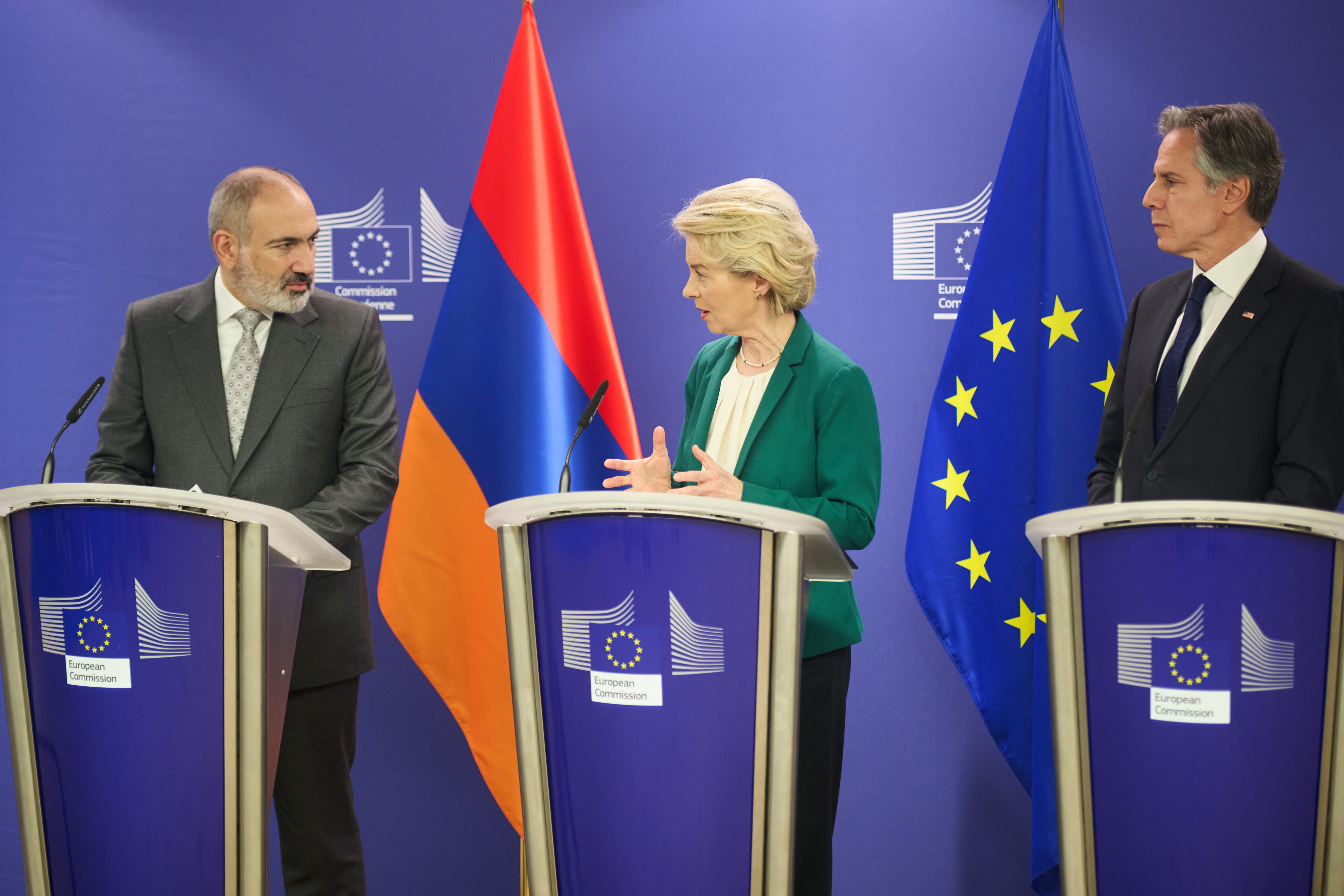
Nikol Pashinyan, Ursula von der Leyen and Antony Blinken © European Commission
Yerevan’s tilt westwards has not been without problems, it faces economic diversification efforts and geopolitical complexities
In what might prove to be a largely symbolic move, the United States and European Union committed to further supporting Armenia in a high level meeting held in Brussels last Friday. In total, the landlocked country still reeling from a devastating war with neighbouring Azerbaijan in 2020 and the influx of 100,000 ethnic Armenian refugees from Karabakh will receive €270 million from the EU over the next four years. The U.S. will provide an additional $65 million in assistance.
The summit had first been announced in a joint statement issued by Armenian Prime Minister Nikol Pashinyan and European Commission President Ursula von der Leyen after their meeting in Granada last October. It also came as Armenia seeks to forge closer relations with the EU and pivot away from its traditional reliance on Russia. Pashinyan and von der Leyen were joined by U.S. Secretary of State Antony Blinken.
“The European Union and the United States support a stable, peaceful, secure, democratic, and prosperous future for Armenia and the region”, a media note posted on the website of the U.S. State Department read . “In this context, we aim to expand cooperation to strengthen Armenia’s resilience, including in key sectors such as political reforms, economic development, and humanitarian support”.
Yerevan’s tilt westwards has not been without problems. Azerbaijan, Russia, and Turkey criticised the meeting, warning that it could lead to greater geopolitical confrontation in the South Caucasus and potentially once more derail hopes for an agreement to normalise relations between Yerevan and Baku. Both von der Leyen and Blinken were quick to call Azerbaijani President Ilham Aliyev in an attempt to dispel fears that military support might be part of the package.
In the past week, tensions had already increased on the border as Yerevan and Baku negotiate the possible return of four non-enclave villages situated within Azerbaijan but under Armenia's control since the early 1990s.
However, according to Armenian media, members of Pashinyan's ruling Civil Contract party were reportedly dissatisfied with the meeting’s outcome and had expected much more. Some had already voiced concerns that any departure from the Eurasian Economic Union (EAEU) – Moscow’s answer to the EU, that Armenia controversially signed up for in 2013 – could wreak havoc on the country’s economy, reliant as it will be for some time on Moscow.
Armenia depends significantly on Russia for gas sold at well below market price, remittances from migrant workers, and as the main marked for its exports. Though Yerevan seeks to diversify its economy and find new markets, in the week prior to the Brussels meeting many commentators cast doubts about Armenian producers' ability to meet stringent EU quality standards. The country also faces additional constraints given that two of its four land borders remain closed.
This reality was not lost on Blinken and von der Leyen, who both remarked on the importance of unblocking regional transportation routes, including in the context of Pashinyan’s recently resurrected “Crossroads of Peace”, and even if it has yet to be fully discussed with neighbouring Iran and Georgia or at all with Azerbaijan and Turkey. “We will also be exploring cross-border transport, if and when conditions allow”, said von der Leyen in her public remarks .
Blinken reiterated the importance of regional integration as “key to security and prosperity” while Assistant Secretary of State for European and Eurasian Affairs James O’Brien added that a final agreement between Armenia and Azerbaijan remained an important objective in a press briefing held afterwards. However, he also hinted that the U.S. hopes to see transportation links bypass Russia, China, and Iran, potentially increasing geopolitical confrontation still further.
“This is the best path for the region to have security over the long term and the development of prosperity – particularly new trading routes that could run from the Mediterranean into Central Asia", he said.
Meanwhile, although the U.S. and EU had previously stressed the importance of facilitating the return of 100,000 ethnic Armenians that fled Nagorno Karabakh late last September prior to its dissolution, von der Leyen instead focused on their “long-term integration into Armenia”. Pashinyan also spoke only of “empowering refugees to rebuild their lives with dignity through housing and economic activation policies".
But if some opposition media also claim that the Armenian Prime Minister was disappointed with the outcome of the meeting, it nonetheless did mark international endorsement of and backing for his leadership at a time of increasing pressure back home. ”I believe that our shared vision of a democratic, peaceful, and prosperous future will continue to serve as the backbone and the guiding star of our mutual relations", he said.






